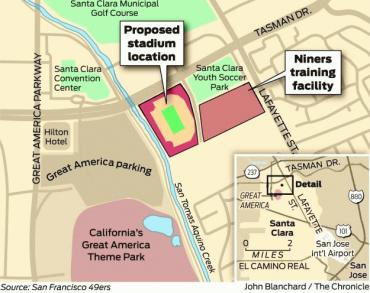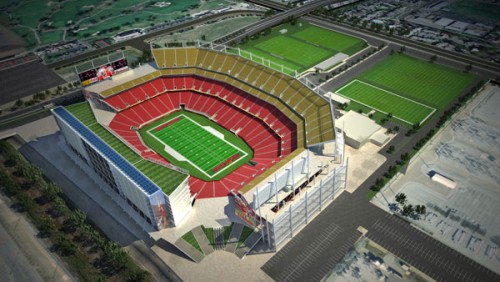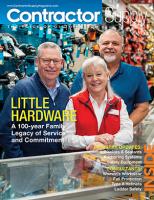Voters to decide fate of proposed $937M 49ers stadium
A vote on whether to build a new stadium to house the San Francisco 49ers will likely come down to money. The stadium is projected to cost $937 million.
 Advocates say the proposed $79 million investment by the city will boost the economy in Santa Clara, Calif., while opponents say the benefits are exaggerated and could saddle the city with debt. The vote is scheduled for June 8.
Advocates say the proposed $79 million investment by the city will boost the economy in Santa Clara, Calif., while opponents say the benefits are exaggerated and could saddle the city with debt. The vote is scheduled for June 8.
Supporters of the plan for the 68,000-seat stadium, backed with more than $1.1 million from the 49ers, talk excitedly about the $249 million the facility will pump into the local economy, the $26 million that will go to local schools and the millions that will flow into city coffers, all for only $79 million in city costs.
"This is a once-in-a-lifetime opportunity," said Pat Kolstad, a former councilman. "We see no downside."
 But opponents of Measure J argue that the financial benefits are inflated, the problems surrounding the stadium understated and the "ironclad guarantee" that the city won't be on the hook for anything more than that original $79 million little more than wishful thinking.
But opponents of Measure J argue that the financial benefits are inflated, the problems surrounding the stadium understated and the "ironclad guarantee" that the city won't be on the hook for anything more than that original $79 million little more than wishful thinking.
The 49ers "want to sell the people on the excitement, the glory and the jobs," said Bill Bailey of Santa Clara Plays Fair, the citizen's group fighting the stadium plan. "They don't want to talk about the numbers."
Stadium deals are about making money for the teams, not the cities that front the cash and back the bonds, Bailey added. Recent NFL stadium deals in Cincinnati and Indianapolis have been financial debacles for the cities and Oakland and Alameda County still have bad memories of their fiscal dealings with the Oakland Raiders for remodeling of the Oakland Coliseum.
The 49ers "are spending millions to make hundreds of millions," said Chris Koltermann, another stadium opponent. "It's not our job to provide value for the 49ers" by helping them build a stadium that will be far more profitable than their current home at San Francisco's Candlestick Park.
Backers lead in poll
It's going to be an uphill battle for the stadium opponents. A poll released late last month by the San Jose Mercury News and KGO-TV found that 52 percent of likely voters in Santa Clara supported the stadium plan while 36 percent intended to vote against the measure, and there has been little to suggest the numbers have moved much since then.
The stadium also has the enthusiastic support of government, business and labor leaders in the community, including five of the seven council members, the trustees of the Santa Clara Unified School District, the president of the city's Chamber of Commerce and a variety of other officials.
The plan wouldn't have that wide range of support if people didn't believe it was good for the city, said Lisa Gillmor, a former councilwoman backing Measure J.
"We're working so hard because the stadium's benefits by far outweigh any risks," she said.
Plans now call for the stadium to be built on a 16-acre site currently used as an overflow parking lot for the Great America theme park. It will be adjacent to the 49ers' current headquarters and training facility and across Tasman Drive from the city's convention center.
According to city figures, the 49ers and the NFL will put up $493 million of the stadium's cost and a new Stadium Authority, formed by the city and its redevelopment agency, will pay $330 million from money collected from stadium naming rights, seat licenses and concession contracts. The city's redevelopment agency would put up $42 million, while eight nearby hotels would provide an additional $35 million.
Other city contributions will include $17 million in redevelopment funds to build a 1,700 space parking garage across the street from the stadium and $20 million from the city-owned power company to move a nearby substation.
Use of city funds
The ordinance that will take effect if Measure J passes would bar the use of city general fund money for the project or new taxes to finance the stadium. It also would require the 49ers to pay for any construction cost overruns.
"We looked at all the other stadium deals, at what was good and what was bad," Kolstad said. The city's agreement with the 49ers "will be the measuring stick for all future deals."
Both sides are on the streets every weekend, knocking on doors and talking with voters.
While the stadium supporters, flush with 49er money, have been plastering the city with "Yes on J" yard signs, running a TV spot and sending out a steady stream of colorful mail pieces, the opponents, with a war chest of only about $3,000, are depending on shoe leather.
Their message is that there are loopholes in the stadium's financing plan that could allow the 49ers to duck their obligations and stick Santa Clara with millions in unexpected costs.
"We're the mission city; we don't want to be the stadium city," Koltermann said. "The only way to defeat (the stadium) is by Santa Clarans talking to Santa Clarans."
Gillmor is confident voters are comfortable with the details of the stadium deal and want to bring the 49ers to Santa Clara. But everything depends on what happens on election day.
"If the citizens vote 'no,' there is no stadium," she said. "There's no going back to the drawing board. It's over."
Source: The San Francisco Chronicle, John Wildermuth















